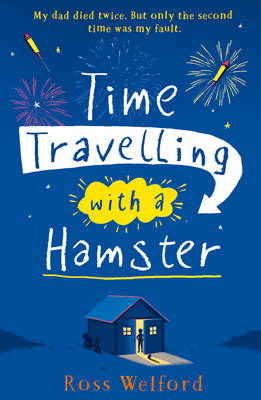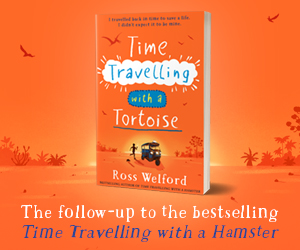We are delighted to welcome Ross Welford as our first Guest Editor for the year. His prize-shortlisted debut novel, Time Travelling with a Hamster, wowed the critics and won him a legion of fans who have devoured his subsequent adventures which explore What Not to Do If You Turn Invisible and When We Got Lost in Dreamland.
.png)
With fans regularly asking if there will be more time-travelling fun with Al Chaudhury, his step-sister Carly and his beloved Grandpa, Ross has returned with a brilliant sequel to his first book, Time Travelling with a Tortoise. Expect science-busting escapades, lots of humour, non-stop excitement and, as with all of his stories, a whole lot of heart. The plot is summed up by one of our young reader reviewers, Lucas Blake; "In this second book of the series, Albert (named after a few famous scientists) accidentally creates a scenario where his Grandad begins to lose his memory. Can time-travel help fix it? Through a journey where Al meets dinosaurs (and a tortoise) in the long distant past, to doppelgängers in a possible future, this is an exciting book." and Poppy Smithson-Zipfel thinks "Time Travelling with a Tortoise is even better than the first book in the series because there were so many unexpected plot twists". Read the full reviews from our Kids Reader Review Panel and our editorial expert, Andrea Reece, here.
As our Guest Editor for January, Ross shares secrets about his writing, his five must-read children's books and his personal thoughts on time-travel! But first he has written a letter to his readers..
Hello everyone!
Writing books is easily the best job I have ever done – and I have done a few, from working in a factory, being a children’s entertainer, a door-to-door confectionery salesman to more ‘glamorous’ occupations such as journalism and TV production. I love writing because I create my own little worlds and feel as though I am living in them for a while: it’s almost like magic.
Magic is something that fascinates me. I don’t believe in witches, wizards and goblins; I’m not even sure if I believe in UFOs, or mysterious creatures, even though I often write about such things. But I love the idea of making impossible things seem as though they are possible. Writing - and reading - a story is an act of imagination and it is the job of the writer to make you suspend your disbelief just long enough to make the story work - to make it ‘magical’. Science fiction and fantasy are all forms of magic, and that is what I write about.
Now I have the great honour to be guest editor of LoveReading4Kids this month: it is such a wonderful resource. I am so pleased to be part of it and to be able to share with you some of the books that I have enjoyed the most. They don’t all have magical themes, but they all share the ability to light up our imagination – and that is the best magic of all.
Ross Welford
.jpg)
Q. When you wrote Time Travelling with a Hamster did you plan a sequel? What drew you back to Al and his story?
A. It was only as I completed the book and I knew that it would be published, that I began to think, “Hang on, what if I wanted to do another…?” Even though the story was wrapped up, I made sure that Al’s time machine was not destroyed beyond repair, and I added a tiny little cliff-hanger (Carly’s text message on the last page). I then forgot all about it – until a way of continuing the story popped into my head a year or so ago.
Q. What do you like about writing time travel stories (and what are the challenges!)?
A. After Hamster, I vowed I’d never do another time travel story, because they are so difficult, but something keeps drawing me back. I think it’s the chance to view our own world with fresh eyes and to realise that, despite all our world’s problems, the alternatives might be much worse and that solutions for those problems are within our grasp. The ‘rules’ of time travel, though, can be tricky; there are plenty of logical plot-holes to trap the unwary writer.
Q. Your books always have fantastical premises – time travel, turning invisible, immortality – but family relationships are central. How important is that to you?
A. You’re right: the adventures in my books are truly astonishing and, frankly, highly implausible! In order that the whole story doesn’t unravel and become ridiculous, everything surrounding the central premise is rock-solid: so there are scenes in the classroom, for example, real places, and a solid family life which isn’t always perfect but is (I hope) believable and acts as something of a counterweight to the fantasy.
Q. What makes the North East such a special setting for your books?
A. Well, I grew up there: that’s one reason why it’s a special setting for me. Also, it’s comparatively unusual: I don’t know of many other children’s writers using real north eastern locations. I also find it a bit easier: if I’m describing a street, or a beach, whatever, I don’t have to make it up! I quite like dropping in bits of Geordie dialect as well. It has now become a bit of a ‘thing’ that I do so I’ll probably continue.
Q. If you could time travel would you, where and why?
A. I wouldn’t go to the past, that’s for sure: what would be the point? So I would choose a destination at some point in the future, but even that is fraught with danger. What if you discover that something dreadful has happened? That, in fact, became the plot of my last-but-one book, The Monkey Who Fell From The Future. So, all in all, I think I’ll stay put thanks!
Q. What was the first book you fell in love with?
A. The Broons and Oor Wullie were page-length comic strips beautifully drawn by Dudley D. Watkins which appeared in Scotland’s Sunday Post. I grew up near enough to Scotland that the annual collections of these cartoons appeared in our house every Christmas and I devoured them, poring over the terrific artwork and Scots dialogue (“Awa’ an’ bile yer heid, granpaw, ye auld scunner!”). At their best, they were perfect short stories with tight plots and great characters. Watkins died long ago, but collections of his work still appear and I keep finding new ones that I haven’t read before.
Q. What does LoveReading4Kids mean to you
Getting the right book into the hands of the child who will love it is a great – and hugely underrated - skill. Bricks-and-mortar bookshops are rarer these days and LoveReading4Kids is brilliant at filling that gap and doing so much more. It’s a real honour to be part of it this month as your guest editor!

As our Guest Editor, Ross has given us his top five children's book recommendations and told us a little about why he thinks they are must-reads:
The Magic Faraway Tree by Enid Blyton
Actually four books (with another two recently added by the marvellous Jacqueline Wilson). Three children, an enchanted forest, a magical tree inhabited by fairy-folk - and that’s even before you get to the magical lands through the clouds. Just glorious!
Oscar’s Lion by Adam Baron
This tale of a mysterious, talking lion who turns up in the life of a small boy is both funny and deeply poignant.
Wonder by RJ Palacio
Augie Pullman, the 10 year-old boy with a facial disfigurement, is such a likeable and positive character that you’re rooting for him from page one.
Bridge To Terabithia by Katherine Paterson
An American classic from the 1970s, with terrific lead characters and an emotional gut-punch that took me completely by surprise.
The Outlaws Scarlett & Brown by Jonathan Stroud
After the success of the Bartimaeus and Lockwood & Co. books comes this tale set in an unspecified future not-so-great Britain. It’s very funny and edge-of-your-seat exciting.
With huge thanks to Ross Welford - and you can find more of his funny, fantastical, adventure books below.















Comments (0)
Leave A Reply
You must be logged in to post a comment.